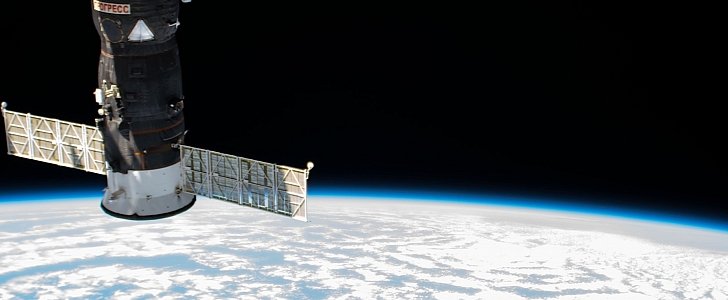On Monday, a Russian Progress 70 cargo ship took off from the Baikonur Cosmodrome in Kazakhstan. Less than four hours after launch, it reached the International Space Station (ISS), setting a new speed record for such trips.
Ever since the mission was being prepared, NASA said speed is a goal of the mission. “The less-than-four-hour trip will demonstrate an expedited capability that may be used on future Russian cargo and crew launches,” NASA said in a statement last week.
The record set by the ship was possible not because of higher liftoff speeds, but because of location and timing. To pull it off, NASA and the Russian space agency used launch windows that allowed the ship to couple with the station in hours, compared to several days the SpaceX's Dragon capsule needs to accomplish the task.
The ship that went up to the station carried almost three tons of food, fuel, and supplies for the astronauts on duty there. Progress joined the Dragon in the parking lot of the ISS, coupling at the Pirs module.
The Dragon is scheduled to return to Earth in August, as it has been built to survive the trip back down. Progress on the other will not head back home until January next year, and when it will, it will burn up in Earth’s atmosphere.
On its deadly trip back down, Progress will take with it the 17-years old Pirs module. This will be replaced with the new Multipurpose Laboratory Module Nauka, whose launch date is yet to be decided.
The Pirs module is the preferred docking port for the Soyuz and Progress vehicles. It was built by Russian S.P. Korolev Rocket and Space Corporation Energia and was launched in space in 2001. It is also used as an exit point for spacewalks by cosmonauts using Russian Orlan space suits.
The record set by the ship was possible not because of higher liftoff speeds, but because of location and timing. To pull it off, NASA and the Russian space agency used launch windows that allowed the ship to couple with the station in hours, compared to several days the SpaceX's Dragon capsule needs to accomplish the task.
The ship that went up to the station carried almost three tons of food, fuel, and supplies for the astronauts on duty there. Progress joined the Dragon in the parking lot of the ISS, coupling at the Pirs module.
The Dragon is scheduled to return to Earth in August, as it has been built to survive the trip back down. Progress on the other will not head back home until January next year, and when it will, it will burn up in Earth’s atmosphere.
On its deadly trip back down, Progress will take with it the 17-years old Pirs module. This will be replaced with the new Multipurpose Laboratory Module Nauka, whose launch date is yet to be decided.
The Pirs module is the preferred docking port for the Soyuz and Progress vehicles. It was built by Russian S.P. Korolev Rocket and Space Corporation Energia and was launched in space in 2001. It is also used as an exit point for spacewalks by cosmonauts using Russian Orlan space suits.

